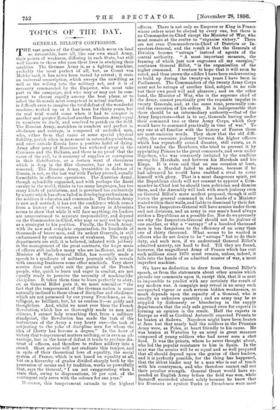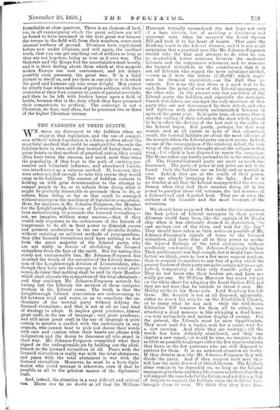TOPICS OF TIIE DAY.
GENERAL BILLOT'S CONFESSION. THE vast armies of the Continent, which seem on land so irresistible, have all, like our own small Army, their points of weakness, differing in each State, but still well known to those who pass their lives in studying their qualities. The German Army is, as a fighting machine, probably the most perfect of all, but, as Count von Moltke said, it has never been tested by retreat; it rests on universal conscription, which sweeps the unwilling as well as the willing into the military net, and it is of necessity commanded by the Emperor, who must take part in the campaign, and who may or may not be com- petent to choose rapidly among the best plans, or to select the Generals most competent in actual warfare. It. is difficult even to imagine the total defeat of the wonderful machine, worked up as it has been for thirty years, but its real trial would come when it had to conquer in another and greater Zorndorf another Russian Army equal in numbers to itself, and resolved to perish on the field. The Russian Army, matchless in numbers and perfect in obedience and courage, is composed of underfed men, who, either from that cause or some special physical liability, perish when in movement in astounding numbers, and once outside Russia have a positive habit of dying. Army after army of Russians has withered away in the Caucasus and the Balkans, and there is no proof that the cause of the evil, be it economy of supplies or corruption in their distribution, or a certain want of cheeriness which is deep in the Slav character, has as yet been removed. The Russian Army, irresistible in defence of Russia, is not, as the last war with Turkey proved, eqnally formidable in offensive operations. The Austrian Army, though splendidly organised, and with perhaps the finest cavalry in the world, thinks in too many languages, has too many kinds of patriotism, and is governed too exclusively by a caste which has often failed in developing enthusiasm in the soldiers it educates and commands. The Italian Army is new and untried, it has not the confidence which comes from a history of victory, and its history in Abyssinia seems to show that while it will face anything, its leaders are unaccustomed to separate responsibility, and depend on the Commander-in-Chief, who may or may not be equal as a strategist to his position. Finally, the French Army, with its new and complete organisation, its hundreds of thousands of brave men, and its ardent Generals, is still embarrassed by certain sources of weakness. The supply departments are still, it is believed, infested with jobbery in the management of the great contracts, the huge mass of officers still includes many who are inefficient, and the Minister of 'War, General Billot, has recently made a speech to a syndicate of military journals which reveals with amazing frankness some other mischiefs. Very short service does not quite suit the genius of the French people, who, quick to learn and eager in combat, are not equally ready to perceive the necessity of machine-like discipline. It takes them time to learn perfectly to obey, or, as General Billot puts it, we must remember "the fact that the temperament of the German nation is more naturally inclined to those ideas of discipline and obedience which are not possessed by our young Frenchmen, so in. telligent, so brilliant, but, let us confess it—so giddy and thoughtless. And, whilst we must ever bless the French Revolution, which has so thoroughly made us men and citizens, I cannot help remarking that, from a military standpoint, the Revolution has made the task of the instructors of the Army a very heavy one—the task of subjecting to the yoke of discipline men for whom the idea of liberty has become a dogma." In the hour of victory that temperament matters nothing, or is even an ad- vantage, but in the hour of defeat it tends to produce dis- trust of officers, and therefore to reduce soldiery into a crowd. Short service will not eradicate this temper, and in spite of their theoretical love of equality, the social system of France, which is not based on equality at all, but on a hierarchy of grades divided sharply both by the possession of means and by tradition, works so powerfully that, says the General, "I am not exaggerating when I state that, owing to dispensations, 50 per cent, of the contingent only serve with the colours for one year."
Moreover, this temperament extends to the highest officers. There is not only no Emperor or King in France= whose orders must be obeyed by every one, but there is. no Commander-in-Chief except the Minister of War, who must remain at the centre to "organise victory." There are not even Commanders-in-Chief of Districts or In- spectors-General, and the result is that the Generals of Division become " satraps " instead of agents of the- central authority. "A most important measure, the framing of which just now engrosses all my energies,' continues General Billot, "is the organisation of the higher command. I venture to hope that it will soon be voted, and thus crown the edifice I have been endeavouring to build up during the twenty-six years I have been- in Parliament. The Commanders of the twenty Army Corps must not be satraps of another kind, subject to no rule but their own good will and pleasure ; and on the other hand, the Minister of War, who is the supreme chief a the Army, cannot practically give the requisite impulse to twenty Generals, and, at the same time, personally con- trol the execution of his orders. It is indispensable that there should be an intermediary authority—that of the Army Inspectors—that is to say, Generals having under their command two or three Army Corps, which they' would have to command practically in time of war." To. any one at all familiar with the history of France those are most ominous words. They show that the old diffi- culty, the excessive jealousy between the higher officers, which has repeatedly caused disaster, still exists, as it existed under the Bourbons, who tried to prevent it by appointing Princes to the great commands, and even under Napoleon, who was constantly irritated by the conflicts among his Marshals, and between his Marshals and his. Kings. It is even said that on one occasion at least, in Spain a Marshal failed to advance, because if he had advanced he would have enabled a rival to cover himself with glory. That is a most dangerous spirit, yet the Republican chiefs will not consent to appoint a Com- mander-in-Chief lest he should turn politician and dismiss them, and the Assembly will look with much jealousy even on General Billot's more modest proposal, though it stilt leaves the general command in the hands of a Minister seated within their walls, and liable to dismissal by their fiat. The seven Inspectors-General will have armies under them and not divisions, and an army in one man's hand always strikes a Republican as a possible foe. Nor do we precisely see why the Inspectors-General should not be jealous of one another, or why a " satrapy " of a hundred thousand men is less dangerous to the efficiency of an army than one of thirty thousand. What seems to be wanted is officers who do not desire to be " satraps " but to do their duty, and such men, if we understand General Billot's admitted anxiety, are hard to find. Till they are found, however, the magnificent Army of France which has cost such millions since 1870 must remain, unless, indeed, it falls into the hands of an admitted master of war, a most imperfect machine.
We have no deduction to draw from General Billot's speech, or from the statements about other armies which precede our comments upon it, except this, that it is next to impossible to predict with any certainty the result of any modern war. A campaign may reveal in an army such unexpected vigour or such serious hidden weaknesses, so much depends upon the capacity of a General, who is usually an unknown quantity ; and an army may be so crippled by dishonesty or blundering in the supply departments that the only safe ground even for experts in forming an opinion is the result. Half the experts in Europe as well as Cardinal Antonelli expected Prussia to be beaten at Sadowa. Napoleon might have been beaten at Jena but that nearly half the soldiers in the Prussian Army were, as Poles, at heart friendly to his cause. He was beaten at Waterloo by an army in great measure composed of young soldiers who bad never seen a shot fired. It was the priests, whom he never thought about, who led the popular resistance to him in Spain. In the next war the armies will be so equal and so well prepared that all should depend upon the genius of their leaders, and it is perfectly possible, for the thing has happened, that the ablest leader may be a man who is out of touch with his countrymen, and who therefore cannot call out their peculiar strength. General Grant would have ex- pended an English Army before the field was won, while Suvaroff succeeded almost solely because he knew that his Russians as against Turks or Frenchmen were most formidable at close quarters. There is an element of luck, too, in all campaigning which the great soldiers say will be found to have increased in the next great war because the troops in the field will, from their numbers, cover such unusual surfaces of ground. Divisions have capitulated before now under illusions, and will again, the cardinal truth, that you can get anything out of soldiers so long as they are not hopeless, being as true as it ever was. The Generals and the Kings feel the uncertainties most keenly, and it is their feeling about them which at this moment makes Europe one vast cantonment, and yet delays, possibly even prevents, the great war. It is a lurid picture to dwell on, and yet there is one side to it in which the good and humane can take some delight. Men cannot be utterly base when millions of private soldiers, with their countries at their feet, consent to years of painful servitude, and then to be left with broken bones upon a field of battle, because that is the duty which they have promised their compatriots to perform. The conscript is not a Christian, we fear, very often, but he practises two or three of the higher Christian virtues.











































 Previous page
Previous page